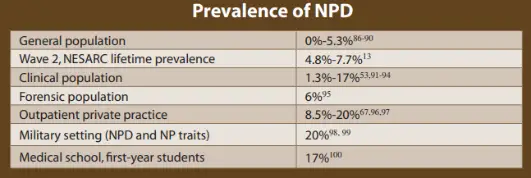Can You Spot the Covert Narcissist in the Hospital?
You can’t throw a stone in the hospital and not hit a narcissist.
While narcissism is a common trait in the USA, it is more common in physicians. Your department chair? Yup. Narcissist. Your CEO? Yup. Wait, is there data to support that claim?
But once you learn to spot a narcissist, you see the trait and even the personality disorder everywhere in physicians.
Before I offend everyone, I want to clarify that it is okay to have narcissistic tendencies and even traits. Remember, bell curves and all. But we all know that bullying is endemic in medicine (and perhaps elsewhere in our society) and must be addressed honestly. Discussing covert narcissistic physicians is an important first step.
Now that I understand narcissism, I see how shadows of it have affected me throughout my medical career. We all have narcissistic colleagues; we see it nightly on news coverage of politicians, entertainers, and athletes.
It is time to talk openly and honestly about the narcissists in medicine and our lives. Especially if you have been betrayed, shame and betrayal live in the darkness. We must bring them to light.
Let’s talk first about the epidemiology of narcissistic physicians.
Epidemiology of Narcissistic Physicians
Data on the epidemiology of narcissistic physicians are small, rare, underpowered, self-reported, and inconsequential.
Once you understand the traits of narcissism in medicine, however, search your gut to see how many of your leaders and fellow physicians have significant narcissistic tendencies. While true personality disorder may be occasional in physicians, the traits are everywhere.

That said, up to 17% of first-year med students have been reported to have narcissistic personality disorder. The numbers reported in the general population are reported at 0.5%-5%.
On the flip side,
… some narcissists are healthy, productive, ambitious, and caring human beings. They rank high on a measure called autonomous narcissism. Healthy narcissism fuels our self-confidence and resilience. When we assign the narcissist label to both garden-variety jerks and the worst examples of humanity, we not only trivialize the pain of hundreds of thousands of survivors; we muddy the waters by assuming narcissism is always bad. ~ Why We Need to Stop Throwing the “Narcissist” Label Around
I’ll let you decide what narcissism means to you. I know what it means to me. Narcissistic physicians abound. What are some common traits of narcissism in medicine?
Traits of Narcissism in Medicine
If you think you hit a narcissist with your stone, you might be interested in understanding some common traits of narcissistic physicians.
DSM will tell you that a narcissist has the following:
- a constant need for admiration
- an unrealistic sense of self-importance
- a lack of empathy
- difficulty forming meaningful relationships
Beyond that, other signs that a physician is a narcissist include:
- Overt or covert self-interest
- A sense of entitlement to special treatment
- Vanity
- Poor response to Questioning
- Outright Lies
- Always needs to be right
- Won’t apologize or take responsibility
- Immune to regulations and guidelines, also known as “rules are for suckers.”
Other Traits of Narcissistic Physicians
I like this bit from How to Spot a Narcissistic Doctor.
…arrogant, feels entitled and believes others have a problem. In subtle or not so subtle ways, they let other colleagues know they are “special,” exaggerating their exceptional skills in patient diagnosis and management. Patients often adore them as they also inflate their achievements in their consulting rooms, while making derogatory comments about the clinical management of other doctors.
You can find more interesting discussions about endemic medical workplace bullying by reading about it.
I have found that it is very difficult to spot a narcissist in the hospital unless they come under some significant stress or unless you are quite close to them. The average physician is not a narcissist. They are decent, hardworking, intelligent, caring, sacrificing, and empathetic men or women trying to do their best in a system with perverse incentives and misaligned values.
But when stressed, you might find the covert narcissistic physician decompensate.
The Covert Narcissistic Physician
What is important to understand is that not all narcissists are overt.
Grandiose or Overt Narcissists are easy to spot. You walk into a room and notice them.
However, you may be less familiar with another type of narcissism: the covert narcissist.
Covert narcissistic physicians live among us; they are subtle and more difficult to spot. Publicly, they may be paragons of society. Privately, you might find a different story.
…with the narcissistic physician you often have a pronounced Jekyll/Hyde series of personality traits. The doctor is above reproach publically. In private he/she is full of volcanic rage, has low impulse control, continually projects his venom on to spouses and children, is obsessively controlling… ~Divorcing a Narcissistic Physician
Let’s learn a little more about covert narcissistic physicians.
Covert Narcissist Physicians
A covert narcissistic physician will be more difficult to spot. We are not going to get out the DSM and start asking them questions, but beyond lack of empathy and a general disregard for others, what are some signs a physician is a covert narcissist?
As another disclaimer, remember that these traits exist in a spectrum and are quite common and normal in many physicians. Accumulating red flags might help you become aware of and better manage these potentially unhealthy relationships.
Know if your covert narcissist is a sociopath.
Covert Self-Importance
While we can all spot the grandiose narcissist in the room, it may be much more difficult to have the covert narcissist admit that they are the most important person in the room. Indeed, many will publicly downplay their accomplishments and disregard others privately in the exam room. In addition, you might see subtle signs of a fragile sense of self, such as a need for reassurance about their self-importance.
Forever Blaming and Shaming
Instead of blaming and shaming for personal leverage, the covert narcissist understands these are best used in triangulation. They won’t overtly attack you; they quietly disregard you to third parties. Behind closed doors, you might hear them blame or disparage a colleague. And they will do the same things to you as to others. The subtle implication is that it is never their fault.
And not infrequently, you might take this as a good-natured or bonding experience. After all, many of us enjoy putting other people down behind closed doors. Or maybe that is the burnout causing us to lose empathy towards our fellow man.
Gaslighting
Since gaslighting is the word of the year in 2022, you might think it would be obvious or easy to spot.
If a physician seems to be creating confusion, obfuscating, or making you second-guess your perceptions, they might be gaslighting.
Having experienced gaslighting, it is incredibly difficult to figure out in real-time. Remember, covert narcissists have practiced subtle mind manipulation since they were four. They understand just how far to go, how to push the limits of your perceptions and memory, and you won’t notice the gaslighting until the snake bit its tail. If you are invested in this person, you will not believe they are capable of treachery and soul-sucking destruction.
Gaslighting is common in medicine.
Disregard
Listen to the language used when taking or giving credit. The covert narcissist will find a way to have the attention always on themselves. It might be purposeful manipulation if they make you feel small, irrelevant, or unimportant in interactions. They may say their goal is to care for people or live for others’ enjoyment or pleasure, but the actions don’t match the words. Covert narcissists find subtle ways to disregard others.
Socialites
Covert narcissists are consummate actors and may be very well regarded in the community. The claws come out only when you have a close relationship with them. You might want to listen if your gut tells you that someone popular has alternative motivations. There is a reason why words like lickspittle, toady, sycophant, groveler, bootlicker, brownnoser, parasite, suck-up, minion, flunkey, and obsequious exist in the world. These folks usually have a cadre of me-tooers following them.
More Bread-and-Butter Narcissistic Behavior
In the hospital, more bread-and-butter displays of narcissism may include:
- Shame or guilt trips
- Superiority
- Condescension, expecting others to solve their problems
- Different private vs. public image
- Belittling, gossiping, or blaming
- Rage or anger
- Unstable empathy toward others
- Gaslighting (especially when being critical but acting like it is out of concern for you)
- Dismissive regarding your experiences or emotions
- Passive-aggressive behaviors
Summary: The Covert Narcissistic Physician
In summary, covert narcissistic physicians are common. Unfortunately, you won’t know they are covert narcissists until you get close or they are under significant stress. Once you have seen covert narcissism in your life, however, it becomes much easier to spot.
Perhaps the most reliable short test to discover if someone is a narcissist is to ask: are you a narcissist? If they reply affirmatively, it often correlates positively with results from more detailed psychometric tests for narcissism. Overt narcissists are proud that they are better than everyone else. Covert narcissists, however, have a slightly different agenda.
Here is my suggestion: ask someone who you think is a narcissist if they are one. If they modify their behavior, they might have traits. They have insight and the ability to understand that their behavior affects others. If they don’t attempt to modify their behavior, they might have narcissistic personality disorder. After all, remember, the personality disorder is defined by the idea that the narcissist thinks they are completely normal and you are the one with the problem. Their abuse is subconscious, and they cannot recognize their shortfalls.
Once you understand grey rocking and its importance, the next step is yellow rocking.
If you are interested in learning more about narcissism, good online clinical reviews are here and also here. Don’t take my word for it; If you think you have a covert narcissist in your life, learn more about it.
It’s time to talk about the narcissists in your life. Do you have a story to tell?
